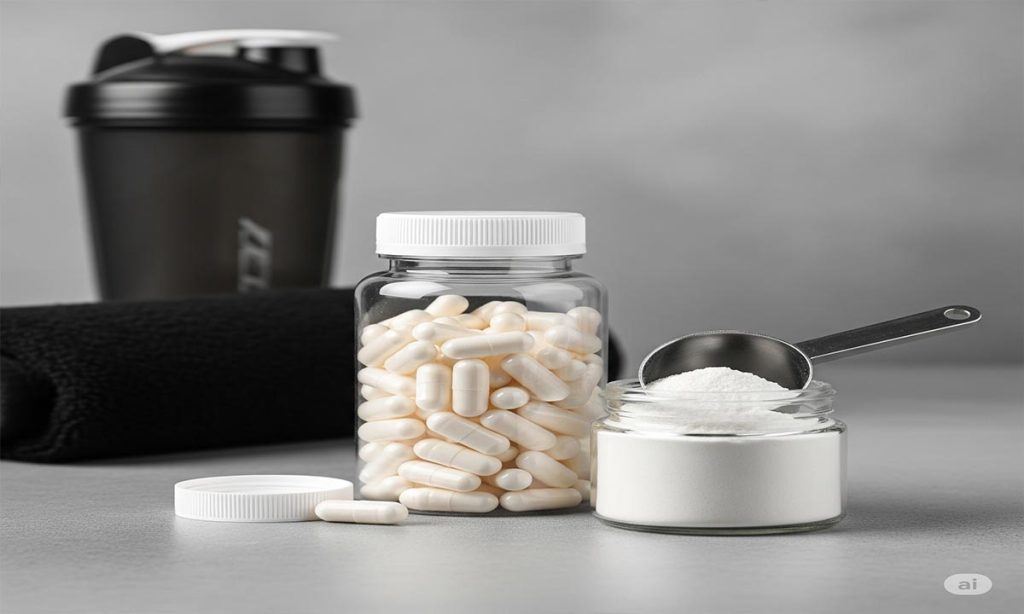Creatine is one of the most researched and effective fitness supplements, widely used to boost strength, power and muscle mass. Athletes often find themselves asking the same question: should I take creatine in pill form or as a powder? In this guide, we’ll break down the key differences between creatine pills vs powder – covering absorption, cost, convenience, types of creatine (monohydrate vs HCl), pros and cons, and more – so you can decide which form fits your needs.

Key Differences at a Glance:
- Formulation: Both pills and powders typically contain creatine monohydrate, the same active molecule. Pills simply package it into tablets or capsules, while powder is loose.
- Absorption: Powder is mixed with liquid and absorbed quickly. Pills must dissolve in the stomach first, which can slightly slow absorption – but studies indicate this speed difference is minor and doesn’t affect results.
- Convenience: Pills are pre-measured, portable and mess-free. Powder requires mixing (with water, juice or a shake) and carrying a shaker bottle or packets creatine pills vs powder
- Dosage Flexibility: Powder allows you to adjust your dose easily (using a scoop or spoon), whereas pills come in fixed strengths (you may need multiple pills to reach high doses).
- Cost: Bulk creatine powder is almost always cheaper per gram than capsules. For example, one review found powder at ~$0.41 per 5g serving versus ~$0.60 for the capsule form.
- Taste and Texture: Powder can be gritty or have a bland taste and may cause mild stomach bloating for some. Pills have no taste (just swallow with water) creatine pills vs powder
Each of these points is explored in detail below.
What Is Creatine and Why Supplement?
Creatine is a compound your body makes from the amino acids arginine, glycine, and methionine. About 95% of the body’s creatine is stored in skeletal muscle as phosphocreatine, which helps quickly regenerate ATP — the energy currency used during high-intensity exercise. In other words, creatine supplementation increases the phosphocreatine stores in muscle, allowing you to train harder and recover faster.
Numerous studies have shown that supplementing with creatine monohydrate can significantly improve muscle strength, power output, and lean mass. Because only a small amount of creatine is obtained through diet (e.g. red meat), most active people find it hard to maximize muscle creatine levels without taking a supplement. Thus, creatine monohydrate (the powder) has become the “gold standard” form recommended by experts creatine pills vs powder
While creatine comes in various chemical forms (monohydrate, hydrochloride, nitrate, etc.), the monohydrate version is both safe and well-studied. Importantly, creatine pills vs powder generally contain the exact same ingredient (usually creatine monohydrate). So before deciding on pill or powder, it’s helpful to understand how they compare in practical use creatine pills vs powder
How Are Pills and Powder Different?
At their core, both creatine pills and powders deliver the same creatine molecules to your body. The main differences lie in form and administration:
- Formulation: Most creatine supplements (pills or powder) are pure creatine monohydrate. The powder is simply loose creatine crystals, while pills are creatine compressed into tablets or packed in capsules. Pills may also contain inactive ingredients (fillers or binders) to hold the tablet together, which powders do not require. These fillers (like gelatin or magnesium stearate) are usually harmless, but they slightly increase cost and could matter if you have allergies or strict diets creatine pills vs powder
- Absorption: When you mix powder in liquid, creatine dissolves, and the body can absorb it rapidly. In contrast, a pill or capsule must first dissolve in the stomach; stomach acids break it down before creatine is released for absorption. In practical terms, creatine in powder form often leads to a faster peak in blood levels, whereas pills take a few extra minutes. However, scientific sources agree this timing gap is negligible for most users: whether one shuttles into your muscles a little quicker or a tad slower doesn’t affect the long-term benefits. In fact, consistency is far more important than small timing differences. As one expert article notes, the question “does speed of absorption matter?” is answered simply with “not really” creatine pills vs powder
- Dosage Flexibility: Powder lets you fine-tune your dose. A typical scoop might be 5 grams, but you can take a half or double scoop easily to adjust. Most products include a measuring scoop for accuracy. Pills, by contrast, come in set milligram amounts (e.g. 500mg or 1g per capsule). To hit a 5g dose, you must swallow multiple pills. This means pills have less dose flexibility. For example, to reach a 20g “loading” dose, one blog points out you might need eight 2.5g capsules per day. In short, powder is ideal if you need a large or very specific dose; pills are easiest for low, fixed doses.
- Convenience: Pills win points for convenience. You simply pop a pill with water—no shaker bottle, no measuring scoop. This makes pills easy to take anytime, anywhere, which suits busy lifestyles or travel. Nutrition experts note that taking creatine capsules is “quick, easy, and convenient,” and it avoids the “mess” of mixing powders. Powder, however, requires you to carry it in a tub or packet and have a drink handy. On the plus side, powder can be added into any beverage (juice, coffee, protein shake), giving more variety in how you consume it. But if you find yourself on-the-go or often forgetting to mix supplements, pills may fit your routine better creatine pills vs powder
- Cost: Generally, creatine powder is far more cost-effective than pills. Bulk powder typically costs less per gram of creatine. Capsules require extra manufacturing (capsule shell, packaging, labor), which increases price. For example, one analysis noted that powder could cost around $0.41 per 5g serving, whereas an equivalent capsule product ran about $0.60 per serving. In most cases you’ll get more servings for your money with powder creatine pills vs powder
- Taste and Mixability: Powder can be unflavored or flavored, but it often has a chalky, earthy taste and gritty texture that some people dislike. You must drink it mixed in liquid. Pills, on the other hand, have no flavor (you swallow them) and thus eliminate taste issues. If you’re sensitive to texture or just don’t like powdery drinks, pills solve that problem.
In summary, all creatine forms provide the same muscle-building benefits, but they differ in how you take them. The tables below outline pros and cons of each form.
Pros and Cons of Powder vs Pills
- Creatine Powder (Pros):
- Cost-effective: Bulk powder typically gives more grams per dollar.
- Fast absorption: Dissolves in liquid and is absorbed more quickly.
- Flexible dosing: Easy to adjust your intake (scoops or spoonfuls), which helps if you want to “load” or taper your dose.
- Versatile usage: Can be mixed into shakes, smoothies or juice. Many users blend it with pre- or post-workout drinks.
- Creatine Powder (Cons):
- Mixing required: You need a shaker bottle or glass and a liquid. This can be inconvenient if you’re in a hurry or without water on hand creatine pills vs powder
- Taste/Texture: Some find unflavored powder unpleasant (bitter, chalky). Flavored versions may add sugars or sweeteners.
- Digestive issues: In rare cases, high doses of powder can cause temporary bloating, gas, or stomach upset (especially during an initial “loading” phase). Staying well-hydrated usually prevents these effects.
- Creatine Pills (Pros):
- Convenience: Simply swallow with water – no preparation. Perfect for travel, work, or busy schedules.
- No taste issues: As one Health article notes, pills “won’t give you any taste or texture issues” since they go down quickly.
- Pre-measured dosing: Each pill/capsule contains a fixed amount of creatine, so dosing is consistent (you know exactly what you’re taking each time).
- Clean and portable packaging: Capsules often come in small bottles or blister packs, which are leak-proof and easy to carry creatine pills vs powder
- Creatine Pills (Cons):
- Cost: Capsules are generally more expensive per gram of creatine.
- Multiple pills needed: A typical 5g daily dose might require 2–4 pills (depending on capsule strength). For loading or higher doses, you may need many pills. Some users report it’s like “choking down” a handful of pills.
- Slower absorption: Because pills must dissolve first, the creatine enters your bloodstream a little more slowly. This doesn’t reduce the effect, but it means benefits might appear marginally later than powder.
- Swallowing difficulty: Not everyone can or wants to swallow multiple capsules at once, which can be a deal-breaker for some.
- Fillers/Binders: Capsules may contain additives (e.g. gelatin) that pure powder doesn’t need. These are usually harmless, but if you have dietary restrictions, you’ll need to check the label creatine pills vs powder
Tips for Choosing Between Pills and Powder
Given that both forms deliver the same active creatine, your decision mostly comes down to personal preference and lifestyle:
- For On-the-Go Convenience: If you travel a lot, pack a gym bag, or just hate mixing drinks, pills might be for you. They let you take creatine anywhere without equipment.
- For Budget and Flexibility: If you want the best price per gram and the ability to easily adjust your dose (or do a loading phase), go with powder.
- For Taste-Sensitive Users: Pills eliminate flavor issues. If you’ve tried unflavored protein shakes or BCAAs and disliked them, a creatine capsule avoids that issue creatine pills vs powder
- For High Doses or Loading: Powder is simpler if you plan a loading phase. As noted, hitting 20g/day with pills could mean 8+ capsules, which is cumbersome.
- Consistency is Key: The most important factor is taking your creatine daily. An expert article emphasizes that regular intake, not absorption speed, is what leads to results. So pick the form you will actually use without skipping creatine pills vs powder
In practice, many people combine both: take powder on most days and keep a few pills handy for travel or busy mornings. There’s no rule that you must pick one forever. The best choice is the one that fits your routine and that you will stick with.
Creatine Monohydrate vs HCl (Salt): What’s the Difference?
Most creatine supplements (pills or powder) use creatine monohydrate, the classic form. However, creatine hydrochloride (HCl) has become popular recently. HCl is simply creatine bound to hydrochloric acid, which makes it much more water-soluble. In practical terms, this means a smaller dose of HCl (about 1–2 grams) can achieve similar blood levels as a larger dose of monohydrate (3–5 grams).
However, whether you take monohydrate or HCl, the pill vs powder debate remains similar. Both forms (monohydrate powder, monohydrate capsules, HCl powder, HCl capsules) deliver creatine into your muscles. HCl’s main perks are creatine pills vs powder fewer side effects (less water retention/bloating) and smaller serving size. But HCl products tend to be more expensive and research hasn’t shown any creatine pills vs powder dramatic performance advantage over monohydrate. If you opt for creatine HCl, you can still choose it in powder or capsule form; all the pros and cons above apply. In other words, creatine HCl powder vs creatine HCl pills will echo the same comparisons (cost vs convenience, mixing vs swallowing) discussed here for monohydrate creatine pills vs powder
FAQs (Frequently Asked Questions)
Conclusion: Which Form Should You Choose?
In the “creatine pills vs powder” debate, there is no absolute winner – both forms will help you reach the same muscle-building goals if used correctly. The best choice depends on your priorities. If you value convenience, portability, and dislike mixing drinks, pills may suit you better. If you prioritize cost, flexibility, and quick loading doses, powder is likely the way to go. Remember that creatine’s benefits come from saturating your muscles over time, not from rapid immediate effects. Whichever form you select, take it consistently (e.g. 3–5g daily) and pair it with proper training creatine pills vs powder
Ready to decide? If you’re still unsure, you could try both: use powdered creatine at home and keep a small container of capsules in your gym bag. Whichever form you pick, creatine will work.
Read Last Post : Magnesium Lotion , Good Shoes For Bunions, Unsweetened Oat milk





